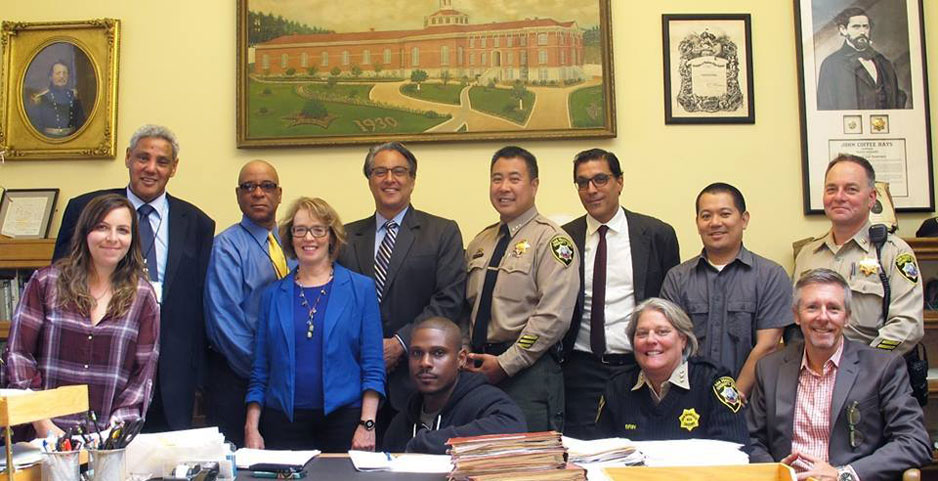Inmate Vocational Training, Improved Re-entry Programs and Officer Magnet School Win 2015 Better Government Competition
Top Criminal Justice Reform Proposals To Be Highlighted at June Awards Gala Featuring Mass. Governor Charles Baker and Former Boston Police Commissioner Edward Davis
BOSTON – Pioneer Institute’s 24th annual Better Government Competition received over 150 entries from non-profits and community groups, law enforcement agencies, and policymakers across the U.S. on the topic, “Improving Public Safety and Controlling Costs in America’s Criminal Justice System.”
“Crime, policing and incarceration are at the forefront of the national consciousness,” said Jim Stergios, Executive Director. “Pioneer Institute believes that criminal justice must mean more than taking criminals off the streets. Our 2015 Better Government Competition focuses on innovative ways to address over-incarceration, recidivism, crime lab processes and other areas of America’s – and Massachusetts’ – troubled criminal justice system.”
REGISTER NOW TO ATTEND 2015 AWARDS GALA
The winning entry, “Reducing Recidivism Through Education,” was submitted by Ross Mirkarimi, Sheriff, City and County of San Francisco, and Steve Good, Executive Director of Five Keys Charter School. Independently designed and operated by the San Francisco Sheriff’s Department, the Five Keys Charter School provides full-time education to adult inmates. The program includes community college dual-enrollment programs, vocational training and training in restorative justice. The proven model reverses the ‘school to prison pipeline’ and reduces recidivism by implementing alternative discipline methods and structuring content that meets the complex learning needs of incarcerated students.
“We are immensely honored to receive this recognition from Pioneer Institute. With only 5 percent of the world’s population, the United States ranks first in incarceration rates globally, and yet, it ranks 21st in educational attainment,” said Sheriff Ross Mirkarimi. “These realities are reconciled by the San Francisco Sheriff’s Department Five Keys Charter High School by deploying a first-of-a-kind strategy for any county jail system in the country, that if we want be tough on crime, we also invest in educational and vocational opportunities for our inmates and the formerly incarcerated. Our declining jail population and declining recidivism rates help corroborate the need to massively shift direction in how we incarcerate in this nation.”
Five Keys Charter High School will receive a $10,000 prize.
Read and print the 2015 Better Government Competition Compendium of Winning Entries or view it online below:
The runners-up, each of whom will receive a $1,000 prize, are:
- Los Angeles Police Academy Magnet Programs, Alise Cayen, Reseda High School Police Academy: A specialized delivery model for high school curriculum developed for at-risk youths interested in a law enforcement career. The program provides a better understanding of law enforcement through coursework, training, mentoring, work and volunteer opportunities and also provides the Los Angeles Police Department with a high quality recruiting resource while establishing a bond between juveniles and their local police.
- The Returning Home Ohio Pilot Project, Terri Power, Corporation for Supportive Housing (New York, NY): A program that combines affordable, permanent housing with a range of supportive services that help vulnerable populations with the complex challenges of homelessness and incarceration. The program provides housing and services critical to the maintenance of recovery and stable living for those who cycle through institutional and emergency systems and are at risk of long term homelessness, and those persons with a serious mental illness and dual disorders.
- Intelligence-Driven Prosecution, Cyrus Vance, Jr., New York County District Attorney: An innovative partnership model that helps reduce and prevent crime by improving the timely and accurate sharing of criminal intelligence throughout the District Attorney’s Office and among all law enforcement agencies. This information-sharing allows for effective use of the vast amounts of data on crime patterns gleaned from thousands of cases each year and helps identify entrenched crime hotspots to design proactive investigation and prosecution strategies to address them.
- Paying for Success in Community Corrections, Kiminori Nakamura, on behalf of the Pennsylvania Department of Corrections: An original approach to community corrections that directly builds the performance goal of recidivism reduction into contracts with privately operated halfway houses, providing financial incentives for recidivism reduction and penalties for increases in recidivism. The use of contractual recidivism performance targets helps to reduce recidivism by making community corrections facilities more accountable for public safety outcomes.
The 2015 winners were selected by a distinguished panel of judges with backgrounds in law enforcement, religion, business, academia, and journalism:
- James L. Bush, Principal, Bush & Co.
- Daniel F. Conley, Suffolk County District Attorney
- Rev. Dr. Ray Hammond, Pastor, Bethel AME Church and Chairman & Co-Founder of the Ten Point Coalition
- Jeff Jacoby, Op-Ed columnist, The Boston Globe, and syndicated columnist
- John Kingston, III, Chairman and CEO. Sword & Spoon Group
- Tracy Palandjian, CEO of Social Finance US
- Dr. Peter N. Ubertaccio, Ph.D., Associate Dean for Interdisciplinary Programs and Director, Martin Institute for Law & Society, Stonehill College
In addition, Pioneer Institute staff selected four entries for special recognition, as follows:
- A Multi-Agency Approach to Promote Reentry Solutions, Reduce Recidivism and Control Costs, Daniel Bennett, Massachusetts Secretary of Public Safety and Security (Boston, MA): A proposal to repurpose corrections facilities to accommodate an expansion of reentry programming and maximize utilization of DOC resources.
- The Ex-Offender Workforce Entrepreneur Project, Dave McMahon, Dismas House (Worcester, MA): An innovative housing and treatment program that uses small farm-driven entrepreneurial enterprise to improve prisoner recovery, skillset development and workforce integration.
- The Employment Bridge Project, Michelle Jones, Indiana Women’s Prison: A proposal for an extensive education and re-entry initiative wherein high performing prisoners serving mid-to-long term sentences could earn a four-year college degree and repay the state for educating them through government employment.
- Cross-lab Redundancy in Forensic Science, Roger Koppl, Syracuse University: A proposal to eliminate the two-fold monopoly in forensic science by mandating independent analyses of evidence through random selection testing performed by multiple laboratories.
The winner, runners-up, and special recognition awardees will be recognized at a June 24th awards gala at the Seaport Hotel in Boston. A compendium of winning entries will be distributed to attendees, policy makers and opinion leaders. At the awards gala, Massachusetts Governor Charles D. Baker will provide welcome remarks, and former Boston police commissioner, Edward F. Davis, will deliver the keynote address.
Pioneer Institute’s Better Government Competition, founded in 1991, is an annual citizens’ ideas contest that rewards some of the nation’s most innovative public policy proposals. As Pioneer’s signature event, the Better Government Competition Awards Dinner attracts hundreds of leaders in the business, non-profit, government, and media communities. Past speakers have included: The Right Honorable James D. Bolger, New Zealand Ambassador; John Stossel, former ABC news correspondent; US Senator Alan Simpson (WY); Massachusetts Governors Mitt Romney, William Weld, Paul Cellucci, and Deval Patrick; David Gergen, advisor to four presidents; Michelle Rhee, head of StudentsFirst; US Senator Scott Brown (MA); financial publisher Steve Forbes; and Boston Mayor Martin Walsh.
###
Pioneer Institute is an independent, non-partisan, privately funded research organization that seeks to improve the quality of life in Massachusetts through civic discourse and intellectually rigorous, data-driven public policy solutions based on free market principles, individual liberty and responsibility, and the ideal of effective, limited and accountable government.




Leave a Reply
Want to join the discussion?Feel free to contribute!